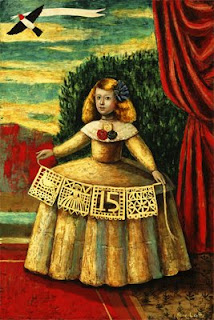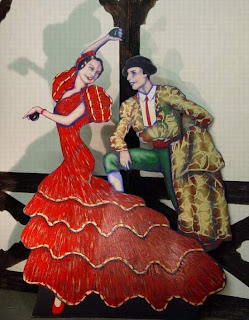 The widespread religion practiced in Mexico is Roman Catholic. It is common to find at least 1 or more statues of Jesus on a crucifix above the doorway of Catholic people’s homes, as well as inside their living rooms. I am personally not Catholic but I have several Catholic friends, and although I am Christian, we have some similar correlating beliefs (such as the same God and disciples, and the practice of communion).
The widespread religion practiced in Mexico is Roman Catholic. It is common to find at least 1 or more statues of Jesus on a crucifix above the doorway of Catholic people’s homes, as well as inside their living rooms. I am personally not Catholic but I have several Catholic friends, and although I am Christian, we have some similar correlating beliefs (such as the same God and disciples, and the practice of communion).Spanish Language  While not the original or 1st language spoken by early Mexicans, Spanish is now the official language of Mexico. While other languages are prominent in specific areas (such as Nahuatl & other Mayan dialects), Spanish is the most commonly used, generally speaking. Of the Mexican people I know, the majority of them consider Spanish their 1st language, and were taught Spanish as the primary language in their household. I took Spanish in high school and was taught by a Mexican Spanish speaker, who taught us the differences between the way Mexicans speak Spanish and the way Hispanics speak Spanish, with different yet similar terms and different accents.
While not the original or 1st language spoken by early Mexicans, Spanish is now the official language of Mexico. While other languages are prominent in specific areas (such as Nahuatl & other Mayan dialects), Spanish is the most commonly used, generally speaking. Of the Mexican people I know, the majority of them consider Spanish their 1st language, and were taught Spanish as the primary language in their household. I took Spanish in high school and was taught by a Mexican Spanish speaker, who taught us the differences between the way Mexicans speak Spanish and the way Hispanics speak Spanish, with different yet similar terms and different accents.
 While not the original or 1st language spoken by early Mexicans, Spanish is now the official language of Mexico. While other languages are prominent in specific areas (such as Nahuatl & other Mayan dialects), Spanish is the most commonly used, generally speaking. Of the Mexican people I know, the majority of them consider Spanish their 1st language, and were taught Spanish as the primary language in their household. I took Spanish in high school and was taught by a Mexican Spanish speaker, who taught us the differences between the way Mexicans speak Spanish and the way Hispanics speak Spanish, with different yet similar terms and different accents.
While not the original or 1st language spoken by early Mexicans, Spanish is now the official language of Mexico. While other languages are prominent in specific areas (such as Nahuatl & other Mayan dialects), Spanish is the most commonly used, generally speaking. Of the Mexican people I know, the majority of them consider Spanish their 1st language, and were taught Spanish as the primary language in their household. I took Spanish in high school and was taught by a Mexican Spanish speaker, who taught us the differences between the way Mexicans speak Spanish and the way Hispanics speak Spanish, with different yet similar terms and different accents.Quinceañera  There are several traditions that embody the Mexican culture, and an example of a religious (as well as cultural) ceremony that Mexicans participate in is the Quinceañera, which is a celebration of a young girl’s journey from childhood to womanhood, occurring on her fifteenth birthday (quince años, hence the name quinceañera). I have been to multiple quinceañeras, which are usually held first in a church where the ceremony begins, then moved to a banquet room or dining hall where everyone eats, dances and makes speeches. They are quite fun and very family-oriented.
There are several traditions that embody the Mexican culture, and an example of a religious (as well as cultural) ceremony that Mexicans participate in is the Quinceañera, which is a celebration of a young girl’s journey from childhood to womanhood, occurring on her fifteenth birthday (quince años, hence the name quinceañera). I have been to multiple quinceañeras, which are usually held first in a church where the ceremony begins, then moved to a banquet room or dining hall where everyone eats, dances and makes speeches. They are quite fun and very family-oriented.
 There are several traditions that embody the Mexican culture, and an example of a religious (as well as cultural) ceremony that Mexicans participate in is the Quinceañera, which is a celebration of a young girl’s journey from childhood to womanhood, occurring on her fifteenth birthday (quince años, hence the name quinceañera). I have been to multiple quinceañeras, which are usually held first in a church where the ceremony begins, then moved to a banquet room or dining hall where everyone eats, dances and makes speeches. They are quite fun and very family-oriented.
There are several traditions that embody the Mexican culture, and an example of a religious (as well as cultural) ceremony that Mexicans participate in is the Quinceañera, which is a celebration of a young girl’s journey from childhood to womanhood, occurring on her fifteenth birthday (quince años, hence the name quinceañera). I have been to multiple quinceañeras, which are usually held first in a church where the ceremony begins, then moved to a banquet room or dining hall where everyone eats, dances and makes speeches. They are quite fun and very family-oriented.Dancing  A major aspect of Mexican culture is the inclusion of dance in their traditions. At parties and family gatherings, music is played and everyone dances, no one is too shy to participate (from what I’ve experienced). There are several types of Mexican dancing, such as flamenco and salsa and traditional dances that tell a story of their history. These dances are usually festive, where the dancers wear colorful, vibrant costumes with big flowing skirts to emphasize their movements.
A major aspect of Mexican culture is the inclusion of dance in their traditions. At parties and family gatherings, music is played and everyone dances, no one is too shy to participate (from what I’ve experienced). There are several types of Mexican dancing, such as flamenco and salsa and traditional dances that tell a story of their history. These dances are usually festive, where the dancers wear colorful, vibrant costumes with big flowing skirts to emphasize their movements.
 A major aspect of Mexican culture is the inclusion of dance in their traditions. At parties and family gatherings, music is played and everyone dances, no one is too shy to participate (from what I’ve experienced). There are several types of Mexican dancing, such as flamenco and salsa and traditional dances that tell a story of their history. These dances are usually festive, where the dancers wear colorful, vibrant costumes with big flowing skirts to emphasize their movements.
A major aspect of Mexican culture is the inclusion of dance in their traditions. At parties and family gatherings, music is played and everyone dances, no one is too shy to participate (from what I’ve experienced). There are several types of Mexican dancing, such as flamenco and salsa and traditional dances that tell a story of their history. These dances are usually festive, where the dancers wear colorful, vibrant costumes with big flowing skirts to emphasize their movements. Mariachi  Accompanying dance is music, and Mariachi music is well known in Mexican culture. At fiestas such as a quinceañera, a mariachi band usually plays upbeat music incorporating trumpets, guitars and sometimes maracas. There are both up-tempo dance beats and also slower, romantic tunes that Mariachi bands play at these events. I’m positive that most of us have heard Mariachi music, while you may not have realized it as such.
Accompanying dance is music, and Mariachi music is well known in Mexican culture. At fiestas such as a quinceañera, a mariachi band usually plays upbeat music incorporating trumpets, guitars and sometimes maracas. There are both up-tempo dance beats and also slower, romantic tunes that Mariachi bands play at these events. I’m positive that most of us have heard Mariachi music, while you may not have realized it as such.
 Accompanying dance is music, and Mariachi music is well known in Mexican culture. At fiestas such as a quinceañera, a mariachi band usually plays upbeat music incorporating trumpets, guitars and sometimes maracas. There are both up-tempo dance beats and also slower, romantic tunes that Mariachi bands play at these events. I’m positive that most of us have heard Mariachi music, while you may not have realized it as such.
Accompanying dance is music, and Mariachi music is well known in Mexican culture. At fiestas such as a quinceañera, a mariachi band usually plays upbeat music incorporating trumpets, guitars and sometimes maracas. There are both up-tempo dance beats and also slower, romantic tunes that Mariachi bands play at these events. I’m positive that most of us have heard Mariachi music, while you may not have realized it as such.Superstitions  The Mexican people tend to be superstitious, especially older generations of Mexicans (such as grandmothers and elders). I know several Mexican abuelitas who have strong beliefs in things such as mal de ojo (the evil eye), which they have perceived antidotes for. Although I do not necessarily hold these same beliefs, I understand that these rituals and traditional beliefs are a major aspect of their upbringing and tie into their Mexican culture.
The Mexican people tend to be superstitious, especially older generations of Mexicans (such as grandmothers and elders). I know several Mexican abuelitas who have strong beliefs in things such as mal de ojo (the evil eye), which they have perceived antidotes for. Although I do not necessarily hold these same beliefs, I understand that these rituals and traditional beliefs are a major aspect of their upbringing and tie into their Mexican culture.
 The Mexican people tend to be superstitious, especially older generations of Mexicans (such as grandmothers and elders). I know several Mexican abuelitas who have strong beliefs in things such as mal de ojo (the evil eye), which they have perceived antidotes for. Although I do not necessarily hold these same beliefs, I understand that these rituals and traditional beliefs are a major aspect of their upbringing and tie into their Mexican culture.
The Mexican people tend to be superstitious, especially older generations of Mexicans (such as grandmothers and elders). I know several Mexican abuelitas who have strong beliefs in things such as mal de ojo (the evil eye), which they have perceived antidotes for. Although I do not necessarily hold these same beliefs, I understand that these rituals and traditional beliefs are a major aspect of their upbringing and tie into their Mexican culture. 




